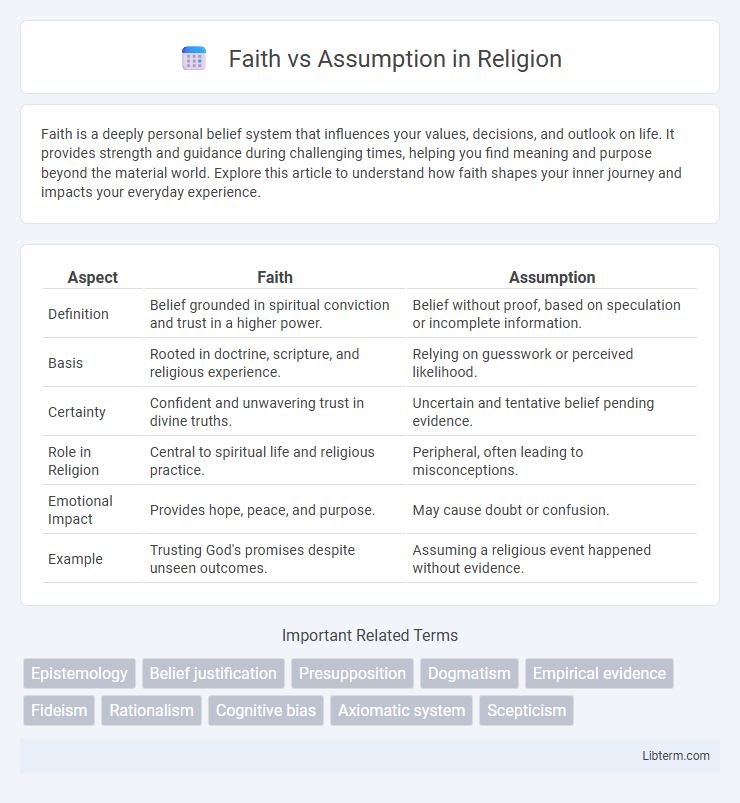Faith is a deeply personal belief system that influences your values, decisions, and outlook on life. It provides strength and guidance during challenging times, helping you find meaning and purpose beyond the material world. Explore this article to understand how faith shapes your inner journey and impacts your everyday experience.
Table of Comparison
| Aspect | Faith | Assumption |
|---|---|---|
| Definition | Belief grounded in spiritual conviction and trust in a higher power. | Belief without proof, based on speculation or incomplete information. |
| Basis | Rooted in doctrine, scripture, and religious experience. | Relying on guesswork or perceived likelihood. |
| Certainty | Confident and unwavering trust in divine truths. | Uncertain and tentative belief pending evidence. |
| Role in Religion | Central to spiritual life and religious practice. | Peripheral, often leading to misconceptions. |
| Emotional Impact | Provides hope, peace, and purpose. | May cause doubt or confusion. |
| Example | Trusting God's promises despite unseen outcomes. | Assuming a religious event happened without evidence. |
Understanding Faith and Assumption
Faith involves trust in something based on spiritual conviction or evidence beyond empirical proof, while assumption relies on accepting ideas without verifying their truth. Understanding faith encompasses recognizing its foundation in belief systems and personal experience, contrasting with assumptions that often stem from incomplete information or bias. Distinguishing between faith and assumption is crucial for making informed decisions and cultivating deeper insight into belief and knowledge.
Defining Faith in Everyday Life
Faith in everyday life represents a confident trust or belief in something or someone, often without empirical proof, guiding actions and decisions. It contrasts with assumption, which is a belief taken for granted without solid grounding or evidence. Faith involves deeper conviction influenced by personal values, experiences, and hope, distinguishing it from mere speculation or guesswork.
What Constitutes an Assumption?
An assumption constitutes a belief accepted without direct evidence or proof, often based on incomplete information or prior experiences. Unlike faith, which implies trust or confidence grounded in conviction or spiritual commitment, assumptions rely on perceived likelihood or convenience rather than certainty. Identifying assumptions involves recognizing unstated premises that shape conclusions without validation through objective data or verifiable facts.
Key Differences Between Faith and Assumption
Faith involves trust based on spiritual conviction or evidence of reliability, while assumption relies on acceptance without proof or certainty. Faith often encompasses hope and belief in the unseen, supported by experience or doctrine, whereas assumption is a preliminary inference made without sufficient information. The key difference lies in faith being a confident assurance, whereas assumption is a tentative supposition.
The Role of Evidence in Faith and Assumption
Faith relies on trust and conviction without requiring empirical evidence, often grounded in spiritual or personal beliefs. Assumption depends on inferred conclusions drawn from limited or incomplete evidence, which may lead to uncertain or incorrect judgments. The role of evidence distinguishes faith's acceptance beyond proof from assumption's reliance on observable or presumed data for decision-making.
Psychological Roots of Belief and Presumption
Faith stems from deep psychological roots involving trust, hope, and conviction often grounded in personal or cultural experiences, whereas assumption arises from cognitive shortcuts and heuristic-driven judgments based on incomplete information. Belief frequently engages emotional and motivational systems in the brain, fostering resilience and meaning-making, while presumption relies more heavily on rapid, unconscious mental schemas prone to bias and error. Understanding these distinct psychological processes clarifies why faith sustains long-term commitment and why assumptions can lead to misinterpretations and stereotyping.
Faith vs Assumption in Decision Making
Faith in decision making involves trusting in evidence, experience, or informed intuition to guide choices confidently, whereas assumption relies on unverified beliefs or stereotypes without supporting data. Decisions based on faith integrate available information and calculated risk, leading to more reliable outcomes compared to decisions grounded in assumptions, which often result in errors due to lack of validation. Incorporating critical thinking and validating hypotheses reduces dependence on assumptions, enhancing the effectiveness of faith-driven decision processes.
Impacts on Relationships and Trust
Faith in relationships fosters deep trust by promoting confidence in others' intentions despite uncertainty, whereas assumptions often create misunderstandings by filling gaps with unverified beliefs. Trust built on faith encourages open communication and emotional security, while trust eroded by assumptions leads to conflict and distance. Cultivating faith over assumptions enhances relational resilience and mutual respect.
Cultural and Religious Perspectives
Faith often represents deep trust rooted in religious traditions, reflecting cultural values that emphasize belief without empirical proof, such as in Christianity, Islam, and Hinduism. Assumption, by contrast, relies on inferred ideas that may not be supported by spiritual conviction, often shaped by social or cultural constructs rather than divine authority. The tension between faith and assumption influences ritual practices, moral codes, and community identity across diverse cultures worldwide.
Building Awareness: Choosing Faith Over Assumption
Building awareness requires distinguishing faith from assumption by recognizing faith as trust based on evidence or experience, while assumption relies on unverified beliefs. Cultivating faith encourages thoughtful reflection and informed decisions, reducing misunderstandings and fostering clearer communication. Emphasizing faith over assumption strengthens relationships and supports personal growth through conscious awareness.
Faith Infographic

 libterm.com
libterm.com